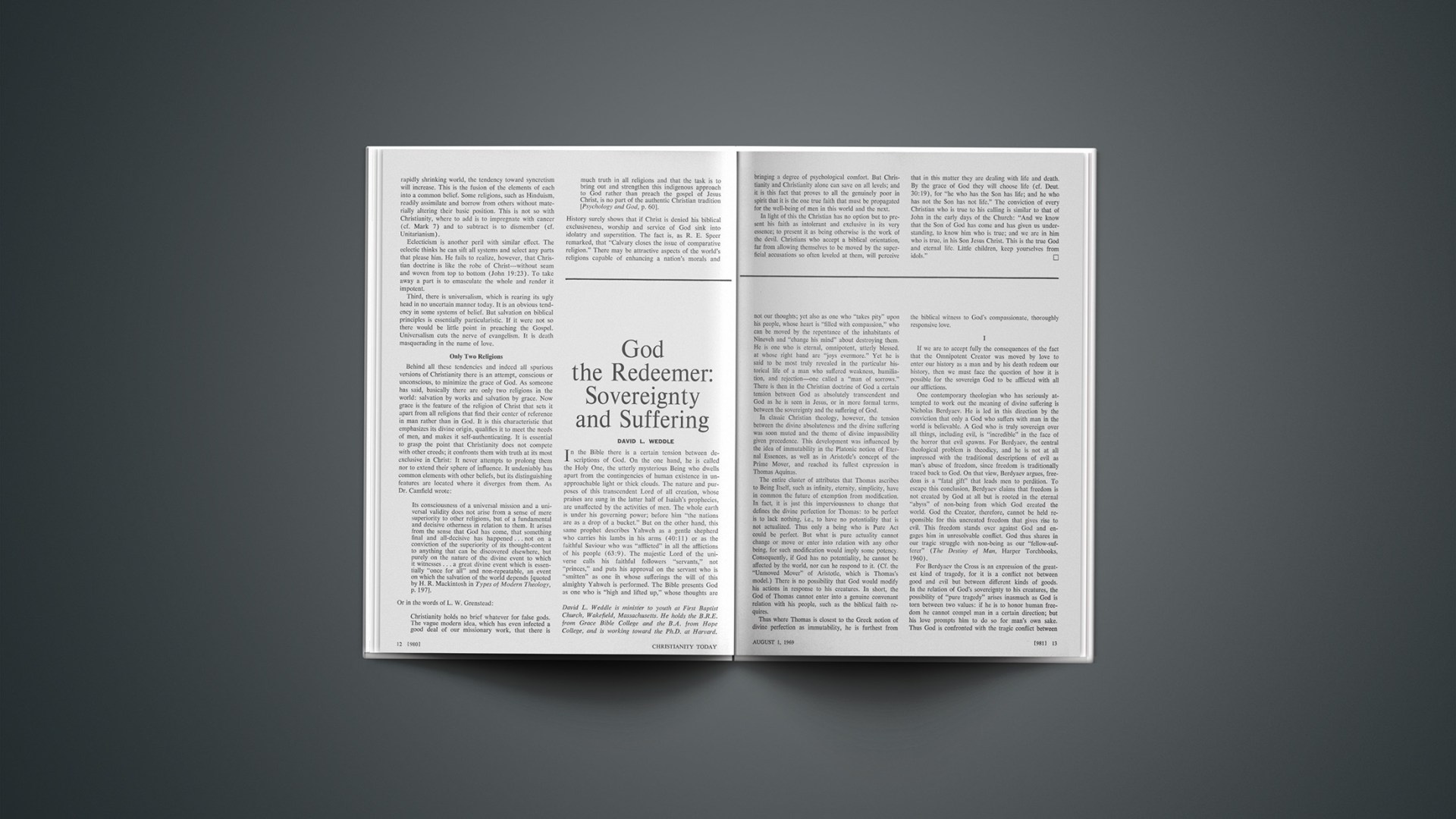In the Bible there is a certain tension between descriptions of God. On the one hand, he is called the Holy One, the utterly mysterious Being who dwells apart from the contingencies of human existence in unapproachable light or thick clouds. The nature and purposes of this transcendent Lord of all creation, whose praises are sung in the latter half of Isaiah’s prophecies, are unaffected by the activities of men. The whole earth is under his governing power; before him “the nations are as a drop of a bucket.” But on the other hand, this same prophet describes Yahweh as a gentle shepherd who carries his lambs in his arms (40:11) or as the faithful Saviour who was “afflicted” in all the afflictions of his people (63:9). The majestic Lord of the universe calls his faithful followers “servants,” not “princes,” and puts his approval on the servant who is “smitten” as one in whose sufferings the will of this almighty Yahweh is performed. The Bible presents God as one who is “high and lifted up,” whose thoughts are not our thoughts; yet also as one who “takes pity” upon his people, whose heart is “filled with compassion,” who can be moved by the repentance of the inhabitants of Nineveh and “change his mind” about destroying them. He is one who is eternal, omnipotent, utterly blessed, at whose right hand are “joys evermore.” Yet he is said to be most truly revealed in the particular historical life of a man who suffered weakness, humiliation, and rejection—one called a “man of sorrows.” There is then in the Christian doctrine of God a certain tension between God as absolutely transcendent and God as he is seen in Jesus, or in more formal terms, between the sovereignty and the suffering of God.
In classic Christian theology, however, the tension between the divine absoluteness and the divine suffering was soon muted and the theme of divine impassibility given precedence. This development was influenced by the idea of immutability in the Platonic notion of Eternal Essences, as well as in Aristotle’s concept of the Prime Mover, and reached its fullest expression in Thomas Aquinas.
The entire cluster of attributes that Thomas ascribes to Being Itself, such as infinity, eternity, simplicity, have in common the future of exemption from modification. In fact, it is just this imperviousness to change that defines the divine perfection for Thomas: to be perfect is to lack nothing, i.e., to have no potentiality that is not actualized. Thus only a being who is Pure Act could be perfect. But what is pure actuality cannot change or move or enter into relation with any other being, for such modification would imply some potency. Consequently, if God has no potentiality, he cannot be affected by the world, nor can he respond to it. (Cf. the “Unmoved Mover” of Aristotle, which is Thomas’s model.) There is no possibility that God would modify his actions in response to his creatures. In short, the God of Thomas cannot enter into a genuine convenant relation with his people, such as the biblical faith requires.
Thus where Thomas is closest to the Greek notion of divine perfection as immutability, he is furthest from the biblical witness to God’s compassionate, thoroughly responsive love.
I
If we are to accept fully the consequences of the fact that the Omnipotent Creator was moved by love to enter our history as a man and by his death redeem our history, then we must face the question of how it is possible for the sovereign God to be afflicted with all our afflictions.
One contemporary theologian who has seriously attempted to work out the meaning of divine suffering is Nicholas Berdyaev. He is led in this direction by the conviction that only a God who suffers with man in the world is believable. A God who is truly sovereign over all things, including evil, is “incredible” in the face of the horror that evil spawns. For Berdyaev, the central theological problem is theodicy, and he is not at all impressed with the traditional descriptions of evil as man’s abuse of freedom, since freedom is traditionally traced back to God. On that view, Berdyaev argues, freedom is a “fatal gift” that leads men to perdition. To escape this conclusion, Berdyaev claims that freedom is not created by God at all but is rooted in the eternal “abyss” of non-being from which God created the world. God the Creator, therefore, cannot be held responsible for this uncreated freedom that gives rise to evil. This freedom stands over against God and engages him in unresolvable conflict. God thus shares in our tragic struggle with non-being as our “fellow-sufferer” (The Destiny of Man, Harper Torchbooks, 1960).
For Berdyaev the Cross is an expression of the greatest kind of tragedy, for it is a conflict not between good and evil but between different kinds of goods. In the relation of God’s sovereignty to his creatures, the possibility of “pure tragedy” arises inasmuch as God is torn between two values: if he is to honor human freedom he cannot compel man in a certain direction; but his love prompts him to do so for man’s own sake. Thus God is confronted with the tragic conflict between his love for man and his concern to preserve human freedom. If he is to honor the creative vocation to which he has called man, he cannot control or predetermine man’s actions. Man must be given the freedom even to curse his Maker. Consequently, God must exercise an “infinite toleration of evil.”
This account of the divine suffering strikes a responsive chord within us. We appreciate a certain “romantic” value in a doctrine of God in which he is our companion in infirmity, rather than the almighty Governor who is beyond all infirmities. But there is a basic ambiguity here that Berdyaev does not resolve. Does God suffer because he wills to honor man’s freedom and thus “endures” the evil that springs from that freedom; or does God suffer because he has no choice, because he is unable to conquer the dark side of freedom? That is, does God suffer by nature or by grace? If by nature, then God is incapable of assuring the ultimate victory of his purposes, for he would always be subject to the uncontrollable contradictions of “free” human actions. In that case he would not be genuinely “sovereign.” Nor could the sufferings of the God-man really impart any higher significance to the suffering in the world, as Berdyaev claims, for they would be of the same order as ours, that is, the inevitable defeat of the creative force at the hands of abysmal chaos.
Another alternative to the doctrine of divine impassibility is proposed by Charles Hartshorne in The Divine Relativity: A Social Conception of God (Yale, 1948). For Hartshorne, the claim that God is able to effect change in others but is wholly unaffected by change himself is the scandal of traditional theology. A God whose goodness is bound up with his static impassivity can at best exhibit a disinterested benevolence toward his creatures; but this is far short of the responsive, participative, sympathetic love that Hartshorne feels is central to the God of religion. The possibility of genuine love in God necessitates his “sym-pathizing” with his creatures—not merely imaginatively recognizing their condition, but actually participating with them in their sufferings, taking their sorrows into his very being and allowing those sorrows to qualify and modify his being. If God is to be genuinely responsive to his creatures, his being must be open to their influence.
God “orders” the world, therefore, by taking into his own being all the currents of experience, our sorrows and joys together. The totality of experience in the world constitutes God’s concrete nature. In this role God is the supreme Patient, instead of the supreme Agent, as in traditional views of sovereignty. However, this is not another brand of pantheism, for God is also “more than” the world in his abstract (or “primordial”) nature. In this role God “sets before” the world certain ideals, such as goodness. These abstract values constitute God’s absolute perfection. The actual realization of those abstract values, however, depends entirely upon the actions of his creatures, which are usually inadequate to achieve the realization of value set before them as a possibility.
This failure on the part of the creatures to actualize a measure of possible good means that God is deprived of good. God suffers inasmuch as he is able to envision the full range of possibilities for the achievement of good and yet realizes that his creatures often fall short of attaining those possibilities. In the separation between vision and fulfillment, between the two “poles” of his being, God is divided, yearning. While appreciative of all value that is achieved, God is still painfully aware of how much more could have been achieved. God is marked by the tragedy of “unfulfilled desire” (Man’s Vision of God and the Logic of Theism, Willett, 1941, p. 294). Thus, because God is dependent upon men for the realization of his purposes, he can never guarantee the triumph of His will.
In both these attempts to account for the divine suffering, God’s power is limited. For Berdyaev, there is a recalcitrant domain of freedom over which God has no ultimate control. For Hartshorne, God is by nature subject to the failings of his “creatures.” Is either of these accounts a true reflection of the faith of those who worship the God of the Bible? Is not a great part of our trust in God grounded in the conviction that God is Lord of our history, directing all things toward the triumphant fullfillment of his eternal purposes? But what is the basis of that hope? Where has God’s redeeming power been revealed?
II
The central claim of the Gospel of Jesus Christ is that through his being lifted up on the cross he has the power to “draw” all men unto himself and into fellowship with God (John 12:32). According to the theology of the Fourth Gospel, Jesus’ death was not a bitter defeat of God’s purposes. Rather, his suffering was itself a kind of triumph; his very weakness was the vehicle through which the all-conquering power of divine love was manifested. That claim raises an important question: How can Jesus’ sufferings be understood as the revelation of God’s sovereign power?
Inasmuch as the question is taken to mean, “How does the death of Jesus accomplish the will of God in the redemption of men?” the answer will involve the “objective” side of the atonement, i.e., what has been done for man in the death of Christ that makes it possible for God to deliver man from the power of sin, quite apart from man’s co-operation.
If, however, the question is taken to mean, “What kind of power does Jesus’ suffering exert upon man?,” then our attention is shifted from the problem of how it is possible for God to forgive man to what is involved in man’s receiving that forgiveness. This is the “subjective” side of the atonement, i.e., what God does in man; and it is here that I wish to focus attention. Perhaps it will help to formulate our question this way: “How does the death of Jesus affect the man who responds to the Gospel?”
At first glance, Jesus’ life does not seem very powerful; the circle of people who were affected by him seems pitifully small. “He came unto his own and his own received him not” (John 1:11). And in the hour of his rejection by men, Jesus prayed for his enemies to the God who had also, in that moment, abandoned him.
What would attract men to such a tragic figure? What power could move them to call him “Lord”? One answer is that such love and faith have a magnificent power of their own—the power to draw men into the way of perfect obedience to God in which Jesus himself walked. By contemplating the total submission of Jesus to the will of God, men are “inspired” to “imitate” him by giving themselves in obedience to the divine will and to the service of others.
But this answer is not wholly satisfactory, for the power of Jesus is not merely that of an exemplary display of what is good and right in human relations. It is not enough that God’s love for men be revealed to them in a particularly impressive way; man’s natural resistance to that love must be overcome. That is, man’s broken relationship with God must be “healed.”
The problem is that the restoration of man to spiritual “health” (“salvation”) cannot be achieved by any human action, however noble, for what is wrong with man is that his very nature is corrupted. We might put it this way. All man’s actions proceed from that matrix of values, attitudes, motives, and allegiances which we call “character” and the Bible calls “the heart.” It is here that man is afflicted with self-worship, which results in his being alienated from other men and from God. Man cannot change his character, for all his acts, words, and thoughts by which he might effect such a change have their origin in his character. What man needs then is a “radical” (i.e., at the roots) change—nothing less than a new “heart” that is placed within him by a power beyond himself.
It is just this power that is manifested in the sufferings of Christ, and man is renewed by that power when he re-enacts Christ’s sufferings in his own life. To be identified with Christ, to acknowledge him as Lord, is to be identified with his crucifixion. This means that one must die to himself in a “hard and bitter agony,” as T. S. Eliot has it in the “Journey of the Magi.” One must relinquish his own ambitions and interests so that he may be raised to a “new life,” lived in conscious obedience to the God whom Jesus called Father (cf. Rom. 6:1–11).
Such a drastic change in orientation and allegiance is beyond human possibility, but it is revealed as a divine gift through Jesus Christ. The power of restoring man’s broken relationship with God is mediated through the sufferings of Christ and displayed as the power of a new life in his resurrection. To experience this renewing power of God by having a personal share in Christ’s death (by renouncing self-interest) and in his resurrection (by receiving a life centered on the interests of divine love) is to gain insight into the relation between God’s sovereign power and his incarnate sufferings.
If it is in Christ that the ultimate purposes of the Creator God for his creation are realized, then the primary mode in which God exercises his providential power upon men is the persuasive (in contrast to coercive) call of suffering love. “God was in Christ, reconciling the world unto himself” (2 Cor. 5:19). God chose to make his appeal to men through the man Christ Jesus. Consequently, he ran the risk of being rejected, even as was Jesus, and thus of suffering. God has left his call to man open to rebuff.
Although he is sovereign, God has chosen to limit his power over men so that the integrity of their freedom may be preserved. Thus he allows himself to be rejected, even as he seeks to elicit men’s trust by offering himself as their servant. In each man who rejects Jesus Christ, God’s purposes are frustrated; God suffers.
However, this gracious suffering of God does not mean that he has abdicated his transcendent sovereignty (despite some recent rumors to that effect). God works among us through the quiet persuasion of the love of Christ; but this does not mean that he is absent nor that he is stymied by the powers of evil in the world nor that he is dependent upon our achievements in order to realize his purposes. While God respects man’s freedom, he does not place it above his own honor or glory. While he seeks to win men through the persuasive power of love, he is not bound by man’s response alone. For his intention that all creation should confess Jesus Christ as Lord shall be realized, even if it must be through the power of a judgment that “suffers” no resistance. The cross speaks not only of love but also of judgment; not only of suffering endurance of evil, but also of victory over the power of evil.
The mystery of the sovereign God who suffers, yet is not defeated, can perhaps be only pictured and not explained, as in the Apocalypse (chapter 5), where a wounded Lamb sits on the throne of everlasting power and authority. The Redeemer is also the Ruler; the Suffering Servant is our Sovereign.
THREE GREY FEATHERS
Is there in silenced song
A louder, clearer song to sing?
Do three grey spinners
Weave from three grey feathers
Songs for night?
Longer lasting songs Than these
This dawn-enamoured bird
His last day sang?
RUTHE T. SPINNANGER










